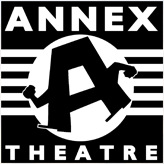Annex’s Marketing Coordinator Emily Sershon sat down over the weekend with ACME Director Mary Hubert to find out more about ACME:

EMILY SERSHON: Hi Mary! Tell us a little bit about yourself.
MARY HUBERT: Hi there! I’m a freelance director and producer who has worked with multiple companies throughout Seattle. You might have seen some of my work with The Horse in Motion, and I also recently directed Girl at Annex. I’ve typically worked on ensemble-driven devised adventures, so I’m really excited to branch into the delightfully comedic, scripted world of ACME!
ES: What drew you to ACME? Have you and [playwright] Andrew worked together before?
MH: I was initially drawn to ACME for a variety of reasons. As an artist who deals frequently with the corporate tech world, I was interested in the ways that Andrew highlighted the culture of upgrades and obsolescence that we see in modern America. I also was fascinated by the idea of creating two very distinct worlds: that of ACME and the cartoon world. Physicalizing animation onstage is an exciting challenge for a director!
Andrew and I have worked together before, so I know his writing style and already have a great relationship with him as a writer. Recently, we produced a short play of Andrew’s called W O L F at The Pocket Theater.
ES: So we have the corporate world of ACME, and a cartoon world… Is ACME a comedy? I understand there’s a mysterious sinister side of the script.
MH: Yes! ACME is definitely a comedy. It is a corporate satire, with a hefty dose of mystery and sinister goings-on. One of the things that Andrew does very well is create a chaotic, comprehensive, madly entertaining environment that still manages to hold a candle to some issues pertinent to our lives as modern-day Americans. And we get plenty of weird science-gone-amok to boot!
ES: That sounds like a jam-packed show! What’s one of the biggest challenges you’ve faced so far?
MH: All of the amazing magic that happens in the show! We have multiple cartoon characters onstage, eight different locations (some of them entirely made up) wacky ACME products, and a Void into another dimension!! This calls for plenty of inventive designs and solutions, and my design team and I have definitely been kept on our toes making the madness of ACME come to life! I’m incredibly impressed by my design team, and I’m really excited to share what we’ve come up with.
I think that we can all relate to this idea with the many tech products we use. But, more than that, ACME takes this concept one step further, applying it to the obsolescence of people themselves.
ES: I love that you’ve made Void a proper noun. I can’t wait to see that on stage! Obviously there’s a lot of theatre magic to look forward to. What do you think audiences will relate to from their everyday lives? I’ve heard you mention the culture of obsolescence.
MH: ACME explores the idea that our products are built to fail, that they are made to only last so long so that we continue to buy the latest “upgrade”. I think that we can all relate to this idea with the many tech products we use. But, more than that, ACME takes this concept one step further, applying it to the obsolescence of people themselves. The workers at ACME constantly face threats of upgrade and termination. Avery, the head of the company, is obsessed with finding the “next big thing”. As we become increasingly fixated on being the best versions of ourselves, and as we all compete for an increasingly shrinking, cutthroat job pool, I think that this portrayal of the disposability of the ACME workers themselves will ring true to many.
ES: Yikes. Yeah, I can definitely relate to that. Is there anything else you want people to know about ACME before they come see it?
MH: It’s a crazy wild ride, so buckle up and get ready for the madness!!
ES: Awesome. Thank you Mary!
MH: Thank you so much!






